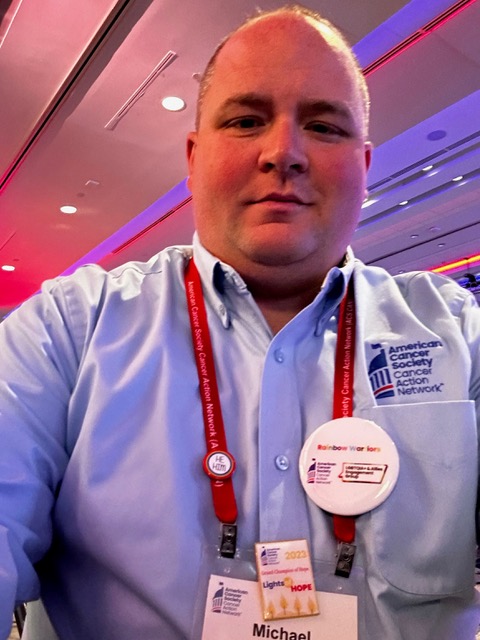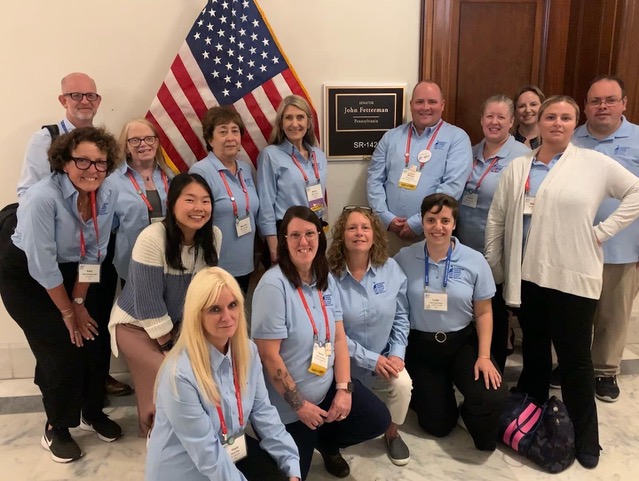On Sept. 14, Michael Myers, a volunteer for the American Cancer Society Cancer Action Network (ACS CAN), traveled to Washington D.C. to lobby members of Congress for various cancer-related causes. He was joined by more than 700 advocates, lobbyists, patients and others from all 50 states (plus Puerto Rico and Guam) as part of ACS CAN’s annual Leadership Summit & Lobby Day.
The group as a whole was able to meet with most of the members of both houses of Congress. Myers, based in Pennsylvania, was part of the group that met with the state’s Congressional contingent, including both Sens. Casey and Fetterman.
Specific issues presented to lawmakers included, of course, increasing federal funding for cancer research through the National Institutes of Health. The group also sought support for a bill which would waive out-of-pocket costs for individuals with the highest risk of prostate cancer, including Black men and those with a family history of the disease. Additionally, support was sought for legislation to create a pathway for Medicare to cover new multi-cancer early detection tests, pending FDA approval.
Overall, Myers feels that the day proved positive and helpful to the cause of cancer advocacy.
“The yearly trip to D.C. is always productive,” he said, speaking to PGN after his return from Washington. “I’d say the day was 100% a success.”
When Myers first volunteered for ACS CAN a decade ago, he didn’t have a personal stake in the cause; his motives were purely altruistic. However, unfortunately, in recent years members of Myers’ immediate family received cancer diagnoses (fortunately their prognoses are good). Understandably, being personally touched by cancer has increased his zeal as an advocate for cancer patients in the halls of government.
There is an additional motivation that colors what he brings to his advocacy work. In recent years, Myers, who is openly gay, learned of the inequities of access to affordable and equitable care among cancer patients who identify as LGBTQ+. In response, two years ago Myers helped found ACS CAN’s LGBTQIA+ Allies Engagement Group.
According to a press release, the group “aims to increase awareness of and advance policy concerning the unique challenges and cancer disparities that the LGBTQIA+ community faces. [Michael] brings the perspectives of his fellow group members into each of his conversations with lawmakers to ensure that gaps in access — whether it’s based on gender identity, sexual orientation, race, socioeconomic status, geography or otherwise — do not continue to compound and create larger disparities in cancer incidence or mortality.”

Myers admits that his group’s work is still in its formative stages.
“We’re in the process of gathering data,” he says, adding that this data can be used to formulate more coherent and inclusive policies that can be presented to lawmakers in future lobbying initiatives.
One of these early fact-finding projects was a survey gauging discrimination presented by ACS CAN last June. To start, that survey found that half of LGBTQ+ cancer patients and survivors report they are concerned they may face discrimination in a health care setting. More than one-third have experienced discrimination in a health care setting due to sexual orientation or gender identity.
The survey also found that some of the forms of discrimination respondents experienced include feeling they were not taken seriously, not being treated with respect, or feeling they were treated differently due to their sexual orientation or gender identity. Hispanic patients (71%), Black patients (44%) and those living in the South (42%) were the most likely to report experiencing discrimination based on their LGBTQ+ identity.
Additionally, the survey found that 24% of respondents reported that their sexuality or gender identification has been a barrier to getting health care or has caused delays in getting the care they need. Respondents living in the south (30%) and midwest (25%) were more likely to report facing a barrier to care due to their orientation or gender identity, while those living in the northeast (18%) and west (14%) were less likely. Non-white LGBT patients (36%) were more likely to have experienced this discrimination as a barrier than white LGBT patients (21%), with Black (44%) and Hispanic (45%) LGBT patients most likely to have experienced discrimination as a barrier to receiving health care.
ACS CAN’s preliminary survey echoes similar findings by other medical and social advocacy groups, as hard evidence of systemic anti-LGBTQ+ discrimination continues to come to light. While ACS CAN hasn’t yet coordinated with other similarly focused advocacy groups, Myers agrees that such partnerships would be a natural fit for future lobbying efforts.
Quite apart from the exacerbation caused by discrimination, and despite progress in research, cancer remains a major killer. The disease still kills more than 1,600 people a day in the United States. In Pennsylvania alone, more than 27,000 people have been lost to cancer so far in 2023.
But Myers remains optimistic that progress is being made, particularly in addressing discrimination against LGBTQ+ patients and survivors, as awareness of the problem starts to take hold. He points to a recent change in ACS CAN’s mission statement. “It now says that our goal is to end cancer for all. Those last two words are very important.”
